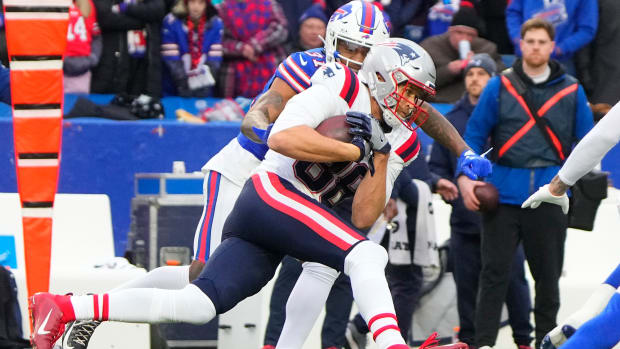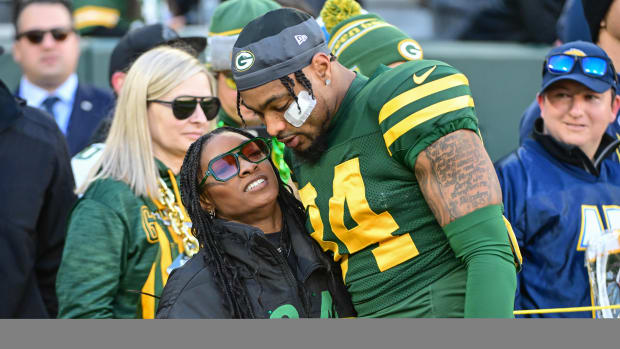Congress Says Commanders May Have Misappropriated Fans’ Money, Misrepresented Revenue
The U.S. House of Representatives’ Committee on Oversight and Reform sent an explosive letter to the Federal Trade Commission (FTC) asserting that the Commanders and team owner Dan Snyder “may have engaged in a troubling, long-running, and potentially unlawful pattern of financial conduct that victimized thousands of team fans and the National Football League.” The Washington Post was the first to report the news.
Using testimony from former Washington sales executive Jason Friedman, the 20-page letter sent to Sports Illustrated cites instances of of the team withholding customers’ security deposits on premium seating and using the money for other purposes. The alleged misappropriation of funds totaled “approximately $5 million” from “around 2,000 accounts” that should have been returned to customers. NFL commissioner Roger Goodell’s name corresponds with an apparent customer who was not refunded their security deposit, according to a spreadsheet provided by Friedman detailing customers’ unpaid credit.
The letter, sent by Rep. Carolyn Maloney (D., N.Y.) chairwoman of the Committee on Oversight and Reform, and Rep. Raja Krishnamoorthi (D., Ill.), chairman of the Subcommittee on Economic and Consumer Policy, also states that ticket revenue that should have been shared with the NFL was falsely processed by Washington. Documents obtained by the committee allege that the team underreported ticket revenue and would, at times, falsely claim that a portion of ticket revenue came from special events instead of Commanders games.
Friedman said “the team maintained ‘two sets of books’—one that was shared with the NFL but underreported certain ticket revenue, and another internal set of books that included the complete and accurate revenue and was ‘shown to Mr. Snyder.’”
“This new information on potential financial misconduct suggests that the rot under Dan Snyder’s leadership is much deeper than imagined,” Maloney said in a statement. “It further reinforces the concern that this organization has been allowed to operate with impunity for far too long. This new information suggests that in addition to fostering a hostile workplace culture, Mr. Snyder also may have cheated the team’s fans and the NFL.
“While the focus of our investigation remains the Commanders’ toxic work environment, I hope the FTC will review this troubling financial conduct and determine whether further action is necessary. We must have accountability.”
Friedman said in his testimony that these financial practices began when things “started to get a little tougher for the team financially,” and noted they were encouraged by senior leadership, including Snyder.
In 1997, while financing the construction of FedExField, former owner Jack Cooke implemented a policy that required fans interested in premium seating—including club and loge seats and private sky boxes—to enter into multiyear leases for the seating. The Commanders would secure a one-time refundable security deposit of 25% of the price of the seats for one year from the customer.
When Snyder took over the team in 1999, Friedman said that instead of returning the deposits, employees were directed to “establish roadblocks to prevent customers from obtaining the security deposits they were due—effectively allowing the team to retain that money.” In some of these lease agreements, the security deposits should have been returned to the customer 30 days after the expiration of the contract, per documents obtained by the committee.
Besides artificial roadblocks created by employees, like the implementation of submitting refund requests through “U.S. mail or FedEx,” Friedman said employees were told to identify security deposits from dormant accounts where it was very unlikely that the customer would ask for a refund.
Per Friedman, those funds were then returned to Washington’s system and converted into “juice,” a term Commanders executives used to identify nonrefunded security deposits and other revenue that was intentionally misallocated, per the committee. He said he was even asked by then chief operating officer Mitch Gershman at the end of one season to “go get us another 100 grand in juice out of the security deposits.”
“The money would then be allocated to a similar license fee, handling fee, interest fee,” Friedman said in testimony. “It would get converted into something where, A, we didn’t have to share it with the league, and B, there was no outstanding obligation related to it. Meaning we didn’t have to issue out a ticket to a customer related to that line item.”
Friedman said he thought executives halted the practice around 2017, when they became concerned “some people were on to them.”
The committee obtained a spreadsheet that tracked and stored information regarding customers’ security deposits. As of July 2016, two season tickets were registered in the excel sheet under Goodell’s name. The address for the account “listed as the NFL’s corporate address in New York,” per the committee. Approximately $1,000 was not refunded from that account, according to the sheet.
The Committee could not determine whether the security deposit was paid or if it had been returned. According to the letter, the deposit appears to have been collected before Goodell became commissioner in 2006.
Though the practice of lease-agreements was terminated by the Commanders in 2000, Friedman says that previous leaseholders were not informed of the change. Instead of informing customers of the policy change when it was time to renew their lease or providing security deposit returns, they continued to charge in full for the renewed leases.
The letter also says Washington withheld funds that should have been shared with the NFL by concealing and misrepresenting ticket sales revenue. In one instance in May 2014, the letter claims that $162,360 of revenue from a Commanders game was allegedly processed as licensing fees from a Navy–Notre Dame game at FedExField so the revenue would not be part of the the NFL’s revenue-sharing pool. Per Friedman, Washington tickets were listed in their manifest at $44 dollars for a game, while the price the team actually charged was $55.
The team committed a similar practice in 2013, when ”Commanders executives appear to discuss intentionally processing $88,000 in shareable revenue from Commanders’ game tickets as bogus, non-shareable licensing fees for an unrelated May 25, 2013, Kenny Chesney concert at FedEx Field,” per the committee.
Friedman also said that team executives would tell him to “misrepresent the availability of affordable general admission tickets to fans” to give customers two options: join a 160,000-name waitlist to go to games or pay for premium-priced tickets. Friedman would tell fans that general admission tickets were sold out and direct them to the wait list, while selling affordable tickets to ticket brokers in bulk.
While Washington leadership later said “that the sales were made but said they were against team policy” and that “the ticket sales employees involved were disciplined,” Friedman said he was given a raise shortly after.
The Commanders have denied any financial impropriety since the allegations arose March 31. It is the second investigation into the franchise since allegations of sexual harassment in Washington’s workplace arose in summer 2020.
The committee held a virtual roundtable Feb. 3 and interviewed six former employees, who detailed misconduct, including claims about Snyder’s own inappropriate behavior. In early April, Friedman secretly testified before the committee and discussed the franchise’s alleged financial malfeasance.
Goodell said in late March that Dan Snyder “has not been involved in day to day operations,” during the probes into his franchise, with his wife, Tanya, running the team.
More on the Problems Facing the League:
- The Browns Will Never Live Down Trading for Deshaun Watson
- How Deshaun Watson and 22 Women Got Here
- Six State Attorneys General Express ‘Grave Concern’ About NFL’s Women Employees
- Congressional Committee Pressures NFL To Release Washington Probe Findings
- This Is Not Just a Time to Create More Pipelines. It Is Time to Simply Hire More Black Coaches.




































